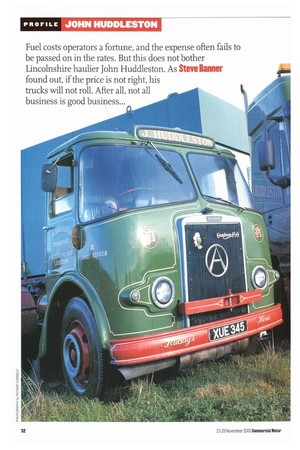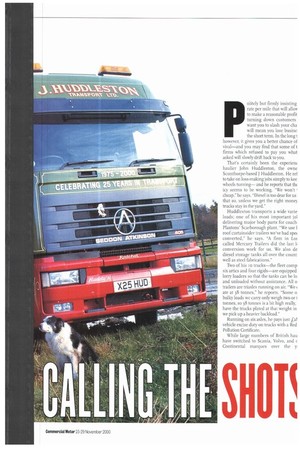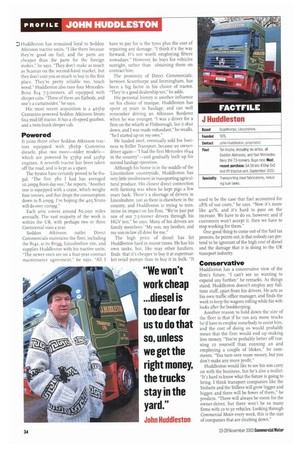Fuel costs operators a fortune, and the expense often fails
Page 34

Page 35

Page 36

If you've noticed an error in this article please click here to report it so we can fix it.
to be passed on in the rates. But this does not bother Lincolnshire haulier John Huddleston. As Steve Banner found out, if the price is not right, his trucks will not roll. After all, not all business is good business... politely but firmly insisting rate per mile that will alloy to make a reasonable profit turning down customers want you to slash your cha will mean you lose busine the short term. In the long t however, it gives you a better chance of vival—and you may find that some oft firms which refused to pay you what asked will slowly drift back to you.
That's certainly been the experiem haulier John Huddleston, the owne Scunthorpe-based J Huddleston. He ref to take on loss-making jobs simply to kee wheels turning— and he reports that th( icy seems to be working. "We won't n cheap." he says. "Diesel is too dear for us that so, unless we get the right money trucks stay in the yard."
Huddleston transports a wide vane loads; one of his most important jol delivering major body parts for coach Plaxtons' Scarborough plant. "We use 1 roof curtainsider trailers we've had spet converted," he says. "A firm in Lot called Mercury Trailers did the last 11 conversion work for us. We also de diesel storage tanks all over the count well as steel fabrications."
Two of his to trucks—the fleet comp six artics and four rigids—are equipped lorry loaders so that the tanks can be to and unloaded without assistance. All o trailers are triaxles running on air. "We t ate at 38 tonnes." he reports. "Some o bulky loads we carry only weigh two or I tonnes, so 38 tonnes is a bit high really, have the trucks plated at that weight in we pick up a heavier hackload."
Running on six axles, he pays just 1:0 vehicle excise duty on trucks with a Red Pollution Certificate.
While large numbers of British hau have switched to Scania, Volvo, and f Continental marques over the y
Huddleston has remained loyal to Seddon Atkinson tractive units. "I like them because they're good on fuel, and the parts are cheaper than the parts for the foreign makes," he says. "They don't make as much as Scanias on the second-hand market, but they don't cost you so much to buy in the first place. They're pretty reliable too, touch wood." Huddleston also runs four MercedesBenz 814 7.5-tormers, all equipped with sleeper cabs. "Three of them are flatbeds, and one's a curtainsider," he says.
His most recent acquisition is a 4o5hp Cummins-powered Seddon Atkinson Strato 6x2 mid-lift tractor. It has a I6-speed gearbox, and a twin-bunk sleeper cab.
Powered
It joins three other Seddon Atkinson tractors equipped with 38ohp Cummins diesels, plus two more—older models— which are powered by 375hp and 325hp engines. A seventh tractor has been taken off the road, and is kept as a spare.
The Stratos have certainly proved to be frugal. "The first 380 1 had has averaged io.2mpg from day one," he reports. "Another one is equipped with a crane, which weighs four tonnes, and that drops the consumption down to 8.2mpg. I'm hoping the 405 Strato will do over io mpg."
Each artic covers around 8o,000 miles annually. The vast majority of the work is within the UK, with perhaps two or three Continental runs a year.
Seddon Atkinson outlet Direct Commercials maintains the fleet, including the 814s, at its Brigg, Lincolnshire site, and supplies Huddleston with his tractive units. "The newer ones are on a four-year contract maintenance agreement," he says. "All I have to pay for is the tyres plus the cost of repairing any damage. "I think it's the way forward. It's not worth employing fitters nowadays." However, he buys his vehicles outright, rather than obtaining them on contract hire.
The proximity of Direct Commercials. between Scunthorpe and Immingham, has been a big factor in his choice of tractor. "They're a good dealership too," he adds.
His personal history is another influence on his choice of marque. Huddleston has spent 25 years in haulage, and can well remember driving an Atkinson Borderer when he was younger. "I was a driver for a firm on the wharfs at Flixborough, but it shut down, and I was made redundant," he recalls. "So I started up on my own."
He hauled steel, eventually sold his business to Stiller Transport, became an ownerdriver again—"I had the first Mercedes 1644 in the country"—and gradually built up his second haulage operation.
Although his home is in the middle of the Lincolnshire countryside, Huddleston has very little involvement in transporting agricultural produce. His closest direct connection with farming was when he kept pigs a few years back. There's a shortage of drivers in Lincolnshire, just as there is elsewhere in the country, and Huddleston is trying to minimise its impact on his firm. "We've just put one of our 7.5-tonner drivers through his HGV test," he says. Many of his drivers are family members: "My son, my brother, and my son-in-law all drive for me."
The high price of diesel has hit Huddleston hard in recent times. He has his own tanks, but, like may other hauliers, finds that it's cheaper to buy it at supermarket retail pumps than to buy it in bulk. "It
used to be the case that fuel accounted for 28% of our costs," he says. "Now it's more like 40%, and it's hard to pass on the increase. We have to do so, however, and if customers won't accept it, then we have to stop working for them."
One good thing to come out of the fuel tax protests, he points out, is that nobody can pretend to be ignorant of the high cost of diesel and the damage that it is doing to the UK transport industry.
Conservative
Huddleston has a conservative view of the firm's future. "I can't see us wanting to expand any further," he remarks. As things stand, Huddleston doesn't employ any fulltime staff, apart from his drivers. He acts as his own traffic office manager, and finds the work to keep the wagons rolling while his wife looks after the bookkeeping.
Another reason to hold down the size of the fleet is that if he ran any more trucks he'd have to employ somebody to assist him, and the cost of doing so would probably mean that the firm would end up making less money. "You're probably better off running to yourself than running 20 and employing a couple of blokes," he comments. "You turn over more money, but you don't make any more profit."
Huddleston would like to see his son carry on with the business, but he's also a realist; "It's hard to know what the future is going to bring. I think transport companies like the Stobarts and the Stillers will grow bigger and bigger, and there will be fewer of them," he predicts. "There will always be room for the owner-driver, but there won't be so many firms with to to 3o vehicles. Looking through Commercial Motor every week, this is the size of companies that are shutting down."




































































































